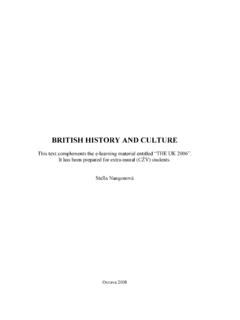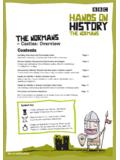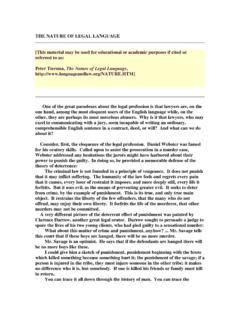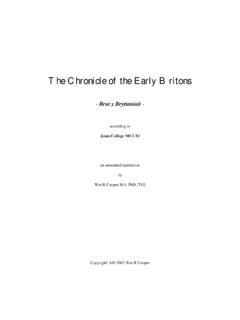Transcription of History of Policing in Lancashire
1 History of Policing in Lancashire The Early Years The anglo -Saxons The Saxons brought tribal customs to this country, including their system of Policing , the keeping of order and abiding by laws. The members of each settlement were held responsible for their own conduct and that of their own conduct and that of their families and neighbours. If someone broke the law, he had to reckon with the members of his community. Each householder was therefore a police officer. A community of about ten families was under the control of a senior man called a tythingman. Senior to him in pre-Norman England was a hundredman, as a geographical area occupied by a hundred or so families was called a "hundred". In Lancashire there were six "hundreds" - Lonsdale, Amounderness, Leyland, Blackburn, West Derby and Salford.
2 In this early society it was the responsibility of the tythingman to get the villagers to behave properly towards each other, to detect any crimes committed and to bring those responsible, through him and the hundredman to the "shire reeve" or sheriff. If a community failed to do this, a fine was imposed on it, and each member was responsible for paying it. When the land became settled under one king, he promised them, in return for their conduct, a state of peaceful security throughout the kingdom. This was called, and still is, the King's (Queen's) Peace, or simply, the Peace. So today a person may be taken to court for "causing a breach of the Peace". Linked to this social responsibility was the obligation on all over 12 years to join in and pursue someone who had committed a felon (serious crime). This was called "the hue and cry".
3 The Normans After the conquest, the Normans introduced their French system of keeping order and also modified the anglo - saxon system. They introduced the "frankpledge" which was a system of requiring individuals, through their townships, to promise to be of good behaviour. It carried with it a punishment if the promise was broken, and is the forefather of today's bail system. It was in early Norman times that the "constable" first appeared. It was from a Latin phrase "comes stabuli" (a master of the stable), and was a very high office in Norman society. However, a century or so after the Conquest and certainly up to the Middle Ages, there were men called constables taking over the role of the tythingman. In 1166, it was made law that villages were to report to the sheriff's tourn (court) anything they thought suspicious about their neighbour, as well as about others who were about at night or who didn't appear to work for their living.
4 Manorial (or leet) courts gradually took over from the sheriff's courts, and it elected those who were to serve for a year on duties for the common good - ale tasters, bread-weigher and constable. The latter was responsible for bringing wrongdoers to the court. Thus, and to the end of the 13th century, the constable was appointed by a local court but had responsibilities for keeping the King's Peace and laws. This is a good moment to introduce the modern definition of a constable, as we can see its historical background: "A constable is a citizen, locally appointed but having authority under the Crown for the preservation of life, the protection of property, the maintenance of order, the prevention and detection of crime, and the prosecution of offenders against the Peace." Statute of Winchester In 1285 came a milestone in the History of order in the United Kingdom.
5 The Statute of Winchester introduced a system of "Watch and Ward", through watchmen in towns which had walls. The watchmen could arrest strangers during darkness. All the townsmen had an obligation to act as watchmen when called, and failure to act resulted in a spell in the stocks, where those arrested were kept. It also revived the "hue and cry" system, making the whole population responsible for pursuing a fugitive, and thirdly it required all males between 15 and 60 to keep arms at his house, to be used whenever the High Constable of a Hundred might order. The type of arms depended on a man's social standing. The poor would have bows and arrows, the rich had to have a horse, a sword, a knife and helmet, and these would be inspected twice a year by the two high constables appointed in each hundred.
6 These high constables were also responsible to the sheriff of the county for selecting petty constables and watchmen. Thus a structure of law enforcement was established which was to last until 1829 when the Metropolitan Police were founded. For 600 years the Statute of Winchester was the only important piece of legislation affecting the running of society, expect for the Justices of the Peace Act 1361, which created the system of those responsible for the good order of society, which the constables and watchmen were there to operate. The link between the "Justices of the Peace", or magistrates as they came to be called, has been important since the Middle Ages, was very important at the time of setting up the "new" police forces and continues to be important to society to this day. Long may it continue to be so.
7 Downhill In the 600 years following the Statute of Winchester, it has to be said that the system went into disrepair and disrepute, particularly towards the end of the 18th century. This was because of several factors, including the fact that the population was growing fast, industrialisation and technology were creating previously unforeseen problems - particularly in the fast-growing towns - and even though railways had not yet arrived, transport by canal and new turnpikes was becoming faster each day. In addition was the point that many high and petty constables, appointed to the post for a year as a matter of public service, did not want the job, preferring to pay someone to do it for them. The people they chose were often motivated only by payment, and if a man would do the job cheaper than another, he got the job no matter how capable he was and how much responsibility he felt.
8 At the lowest end of the scale, watchmen were often old men who preferred to sleep in their boxes at night rather than arrest strangers. These enforcers of the laws of the land were often of the poorest quality, doing a poorly paid job. Society was getting what it paid for. Crime was increasing tremendously, people would not travel on the roads for fear of being robbed, and feared that their house would be burgled. Some private-enterprise schemes, the equivalent of today's private security companies, were operated and some self-help groups, similar to vigilantes, were founded to give the members better protection against felons. In addition, some magistrates were corrupt and had to be replaced by stipendiary magistrates - ie magistrates paid (a stipend or salary) to ensure their integrity. Against this background, the Metropolitan Police was founded, guided by the Home Secretary, Robert Peel, a man of Lancashire background.
9 He is the father-figure of the police service. Lancashire in the 1830s and 1840s Lancashire was the first industrial society in the world, the place where anything and everything was made, and where coal was mined. It was the birthplace of the factory system and it needed a big population to operate the mines and factories. The first canal in the world was here, with more canals and railways following it by the early 1830's. The workforce needed was far bigger than the existing Lancashire population, and had to be imported from elsewhere in the country, from Ireland and from Scotland. These men and women came from rural areas to live huddled together in the cities and the villages fast became towns. Sir Peter Fleetwood-Hesketh was planning a brand new town from land he owned by the River Wyre's estuary - Fleetwood was to become Lancashire 's first "new town".
10 Blackpool was a hamlet reached after a tortuous coach ride from Preston. Most of this industrialisation was taking place in the southern half of the county, below a line driven east from Preston. The county stretched from the Westmorland boundary, north of Lancaster, (and also Westmorland) to the Mersey, Rochdale, Oldham, Ashton-under-Lyne and Eccles. The county's population increased by 201 per cent between 1801 and 1851. Crime statistics, first introduced in 1805, show that Lancashire had a considerable crime rate compared with the rest of the country. Between 1827 and 1831, 2,215 each year were tried by the higher courts, with one in every 600 of the population being so tried. There were five main prisons in the county, (four being controlled by the county magistrates) holding 1,500 at any one time.








